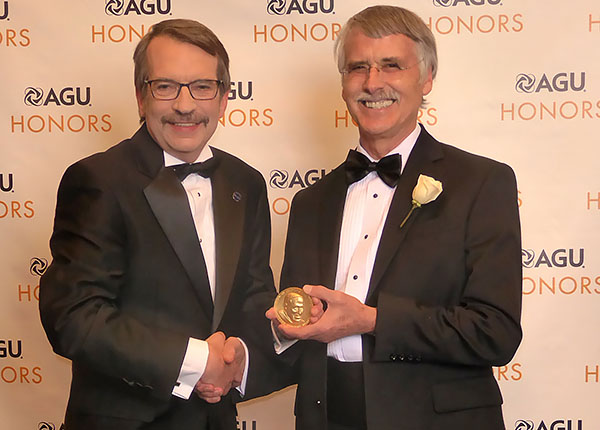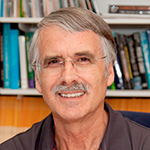Winner of the 2017 AGU Roger Revelle Medal
Courtesy of Guardian News & Media Ltd. written by John Abraham on July 27, 2017 [Article]
The American Geophysical Union - the pre-eminent organization of Earth scientists - presents annual awards to celebrate the achievements of scientists. The awards, which are often named after famous historical scientists, reflect the contributions to science in the area of the award namesake. With the 2017 award winners just announced, it’s appropriate to showcase one of the winners here.

The 2017 winner of the Roger Revelle medal is Dr. Kevin E. Trenberth. One of the most well-known scientists in the world, he is certainly the person most knowledgeable about climate change that I know
The Roger Revelle award is given to an honoree who has made outstanding contributions to the understanding of the atmosphere and its interactions with other parts of the climate system. Named after Roger Revelle, who was critical in bringing the idea of human-caused climate change to the scientific community, it is amongst the highest honors. Named after Roger Revelle, who was critical in bringing the idea of human-caused climate change to the scientific community, it is amongst the highest honors. Revelle wrote regarding increasing carbon dioxide in the atmosphere in 1957: "human beings are now carrying out a large scale geophysical experiment".
Certainly the other scientists nominated were of incredible quality. Why was Kevin granted the award? I cannot answer this for certain because I was not on the committee, but it’s possible that he won strictly because of his scientific contributions.
Dr. Trenberth is a leading voice in the concept of Earth Energy Imbalance (which is really the rate of global warming). He also pioneered research related to the interactions of the atmosphere with the oceans, particularly the El Niño/La Niña cycle. He has worked on advancements to climate models and to experimental observations of climate. Another major area of contribution is the changes in precipitation with climate change, and especially the frequency and intensity of extremes. He has also changed the approaches to attribution of human-caused climate change.
But perhaps Dr. Trenberth won the award because of the sheer volume and impact of his scholarship. He is closing in on 70,000 citations to his work. This puts him near the top of the list worldwide for impact.
Or maybe he won because of his tireless efforts in service to the scientific community, with leadership roles in the IPCC, the World Climate Research Programme, NOAA, and other groups. Or lastly, it could be because he is tireless as both a researcher and a communicator. Dr. Trenberth can be heard or read almost weekly in major newspapers, magazine articles, radio and television shows. When reporters need complex climate science explained, he is a go-to person, and has been for years.
His personal life is interesting too. Born in New Zealand, he studied mathematics before embarking on meteorology. His time in New Zealand provided him with a different geographic perspective than his American and European colleagues. New Zealand is more impacted by certain climate oscillations, like fluctuations in the temperature of the Pacific Ocean surface waters. Certainly these experiences affected his climate views.
Growing up, family, school, and sports – he was a top rugby player - were important. He was somehow able to balance these three pillars of life without sacrifice to his academics. Born into a family of very modest means, Kevin had to make his own fortunes. His early academic performance resulted in financial scholarships for school.
After some time spent in the New Zealand army, he was ready to embark upon his scientific career. After winning a New Zealand government fellowship to do his doctorate at MIT, he met his future wife Gail who was as ever energetic, smart, and involved in life as was Kevin. They had a daughter in New Zealand, and, after moving to the U.S. as a professor at the University of Illinois, began fostering, which led to the adoption of their second child.
Somehow Kevin and his wife kept both career and family center in their lives and Kevin’s reputation as a top-rated scientist increased. He moved to the National Center for Atmospheric Research in 1984. His scientific work and his public communication efforts meant that he became a frequent target of groups that try to deny human-caused climate change or diminish its importance. The problem with Kevin is, he knows so much you can just assume he is smarter than you.
Well-known contrarians such as Richard Lindzen, Roy Spencer, and John Christy have had their works rebutted by Trenberth for technical errors. Trenberth has also crossed paths with vocal down-players of climate change like Roger Pielke Jr., who reportedly threatened Trenberth by email. Pielke Jr. was working for Nate Silver’s 538 website; his actions lead to Nate Silver stating “We had candid conversations with Michael Mann and Kevin Trenberth (about the emails). We made clear that Roger’s conversations with them did not reflect FiveThirtyEight’s editorial values.”
Why would I write about this aspect of Trenberth’s career? Because it shows that he has suffered slings and arrows for his tireless work. He has spent his career being honest about the limits of our knowledge of the Earth’s climate but also being clear about our certainty of human-caused climate change. His reward for this tireless service to society has been attacks on his research and his person. However, he has been impeccable in character and scholarship. The ill-advised who tangle with Trenberth have discovered they are on the short end of the intellectual battle.
It is my view that the AGU, by granting awards such as these to scientists, effectively encourage others to reach the highest standards in their profession.
Interested readers can go here to read about the other AGU award winners for the 2017 year or view the complete January magazine here that features his nomination and acceptance speech.
View the nomination and acceptance speech full screen
Back to main page



 ORCID iD
ORCID iD